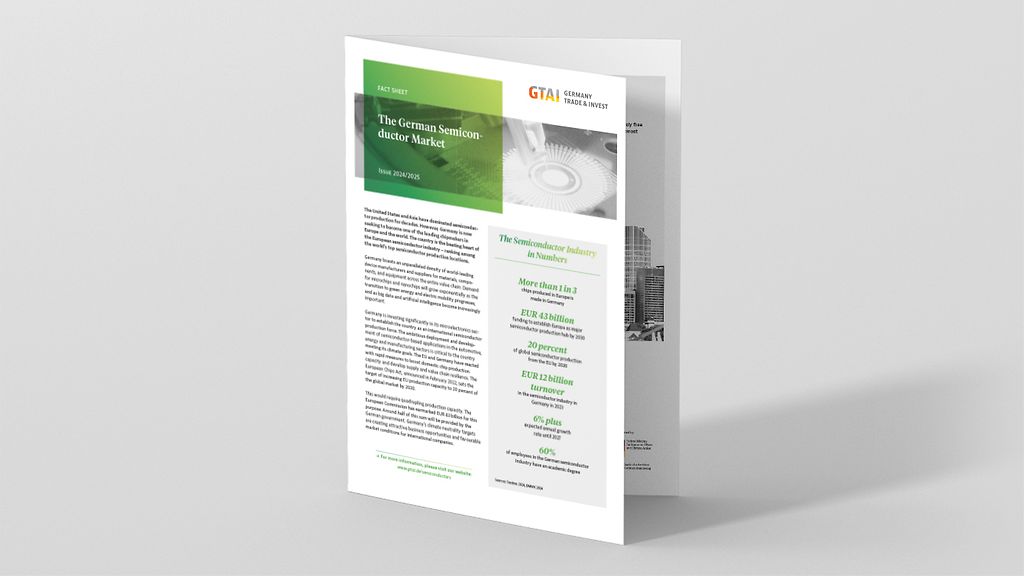industry turnover in 2023
Your company is already operating in Germany and you would now like to export worldwide?
Key Facts
Global Player
Germany is a key market in the global semiconductor industry – boasting world-leading device manufacturers and suppliers of materials, companies, and manufacturing equipment.
Impressive Showcase Projects
Showcase projects attract suppliers across the entire value chain to build resilience and stability in the industry.
Strong regional clusters
Regional clusters with business networks situated across the country help form a complete semiconductor value chain.
Automotive and Industrial Applications Powerhouse
Germany’s strengths lie in producing chips for automotive applications and industrial automation. German players such as Infineon and Bosch are recognized as global leaders in semiconductor technologies for these markets.
Opportunities
Increased levels of automation in passenger vehicles and the ongoing digitalization of industry are just two areas driving demand for advanced microelectronics solutions in application industries.
Automotive Semiconductors
The automotive semiconductor market generated a turnover of approximately EUR 39.8 billion in 2022. Compound annual growth is forecast at +15.7 percent for the five-year period 2022 to 2027. The transition to autonomous-ready cars has accelerated in recent years and will continue to do so as autonomous driving becomes a reality. This shift is giving birth to new business models and a data-based ecosystem for connected in-car services. These developments are expected to drive significant growth in the semiconductor market.
Industrial Electronics Semiconductors
Microelectronics continue to play a pivotal role in the ongoing digitalization of industrial production. Microelectronics and microsystems remain central to Germany’s Industrie 4.0 project to establish the country as an integrated industry lead market and provider. As key enablers in industrial automation, electronics and sensors are transforming production systems and products into cyber-physical systems (CPS). They are making production intelligent and automated – enabling machines to process, measure, detect, and analyse different positions, heights, appearances, lengths, and displacements in production.
Embedded system production technologies and intelligent production processes are evolving rapidly. The integration of IoT in manufacturing is transforming industry and powering a massive digital transformation. The future of embedded systems is being shaped by several trends including greater IoT integration, edge computing and the AI revolution.
News
Business Environment
Germany supports companies in the semiconductor industry as part of European efforts to develop resilient supply chains.
EU Chips Act
One such measure is the EU Chips Act – an initiative that aims to bolster Europe’s competitiveness and resilience in semiconductor technologies and applications. It was adopted by the European Council and entered into force on September 21, 2023. The Act seeks to mobilize more than EUR 43 billion in public and private investments. The legislation sets out measures to prepare, anticipate, and swiftly respond to any future supply chain disruptions. The EU Chips Act also aims to increase the global market share of European semiconductor production from 10 percent to 20 percent.
Germany has shown significant determination and support to the EU Chips act. It has already earmarked around EUR 20 billion for four major projects by Intel, Infineon, ZF/Wolfspeed, and the TSMC consortium.
Important Project of Common European Interest – ICPEI 2
Another important initiative is the ICPEI 2 (Important Project of Common European Interest). It supports transnational cooperation projects in the microelectronics field. It involves more than 90 entities including established companies and start-ups alike. The project seeks to invest in major, innovative industrial capacities at all choke points of the supply chain, such as critical raw materials, equipment, wafers, research, pre-production, and design. The German Federal Ministry for Economic Affairs and Climate Action has selected 32 company projects in microelectronics to be funded with a volume of more than EUR 10 billion as part of ICPEI 2.


